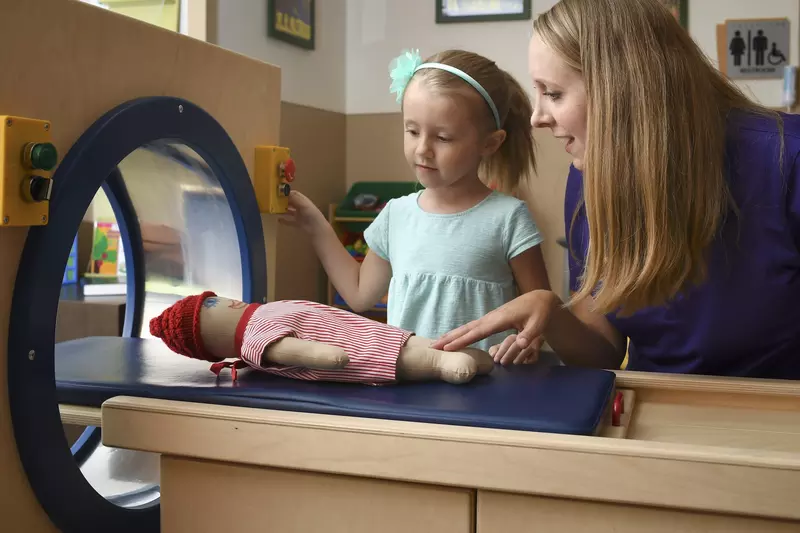- AdventHealth

Recently, there’s been a disturbing image making the rounds on social media showing children immobilized in a device known as a Pigg-O-Stat. This device, and others like it, are used by some hospitals to “position infants and young children for an appropriate X-ray without significant complications.”
But AdventHealth for Children’s certified child life specialist, Chantelle Bennett, disagrees with this definition.
“Without significant complications,’ doesn’t take into consideration the long-lasting emotional harm, traumatizing stress, anxiety and fear the Pigg-O-Stat can induce. At AdventHealth for Children, emotional harm is a significant complication,” says Bennett.
What is the Pigg-O-Stat?
The Pigg-O-Stat was introduced back in the 1960s as an immobilizing device for children receiving X-ray screening. Back then, the Pigg-O-Stat was viewed as “quick and easy” and “got the job done.” But at AdventHealth for Children, we look beyond the “quick and easy” and focus on the whole health of the children we serve — body, mind and spirit.
“The emotional harm and upset caused by immobilizing devices such as the Pigg-O-Stat and Papoose Boards — which are equally barbaric and emotionally traumatizing — isn’t part of our atraumatic child- and family-centered culture,” explains Bennett.
A Better Method of Pediatric Imaging Without Restraints
In the 1990s, AdventHealth for Children was introduced to “positions of comfort” by Mary Barkey and Barbara Stephens of Rainbow Babies and Children’s Hospital.
“Positions of comfort promote a child-friendly position where your child sits up as much as possible while you hold them chest to chest, or heart to heart, or have the parent/caregiver lay down next to them providing comfort,” says Bennett.
Positions of comfort minimize the frantic flailing induced by the fight or flight mechanism caused by holding children down or using restraining devices such as the Pigg-O-Stat.
Positions of comfort at AdventHealth for Children are any positions where:
- Your child isn’t held down or restrained
- Your child has their head elevated as much as possible to avoid lying completely flat
- Your child is provided comfort and emotional support by you or a staff member who isn’t involved with the procedure
Child Life Specialists Provide Compassionate Care for Your Child
“At AdventHealth for Children we’re blessed to have a team of 26 certified child life specialists who work in every area of our inpatient and outpatient settings supporting the psychosocial needs of our neonatal and pediatric patients and families,” says Bennett.
“The primary roles of the child life specialist in our imaging areas include helping to reduce stress and anxiety for your child, while providing education on their scheduled procedure and assisting them with positive coping skills during their pictures or scans.”
As part of their training, certified child life specialists must complete a minimum of 600 clinical hours studying under a certified child life specialist and pass a national certification exam.
These specialists work with children and their families to help them cope with the unknown challenges of hospitalization and health care experiences. They do this by providing children with developmentally appropriate education and preparation for medical procedures, assisting with pain management and coping strategies, clarifying misconceptions, and offering self-expressive activities and play while the child receives care.
Easing Your Child’s Imaging Experience at AdventHealth for Children
“We’re the only hospital within the Central Florida community with two full-time certified child life specialists in our imaging department who are able to create positive experiences during imaging procedures for pediatric patients and their families by providing preparation and assisting with ways to help children cope before, during and after imaging procedures,” says Bennett.
“This allows us to not only produce optimal images since the children are able to hold still, but also aids in reducing the amount of radiation children receive due to not having to repeat scans if your child wasn’t able to hold still.”
If your child needs an MRI, our Picture Perfect Program prepares your child for their scan by allowing them to get familiarized with the procedure, the machine and the noises, and educates them on what the procedure is like. Special goggles are also provided for your child to watch a movie during their MRI.
AdventHealth for Children’s pediatric imaging is staffed by a dedicated, expert team who works collaboratively to individualize your child’s care, keeping them emotionally and physically safe.
Bennett explains that one of the most rewarding parts of her job is “to watch a child come into our hospital scared and nervous and watch them walk out high fiving, smiling and feeling a sense of accomplishment after having a positive experience.”
Click here to learn more about the difference our child life specialists can make in the care and imaging of your child, or to speak with one of our child life specialists, please call407-303-9456.



